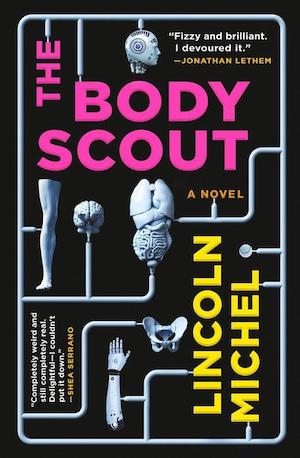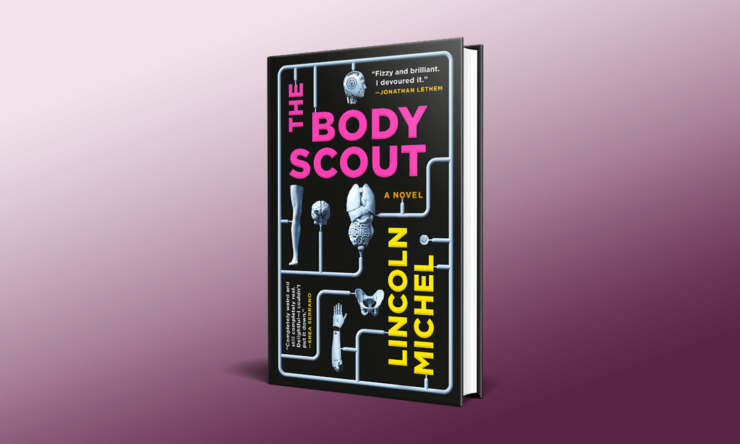Right about here is where I confess my fondness for the 1991 film The Last Boy Scout. Directed by Tony Scott and starring Bruce Willis and Damon Wayans, it’s tonally somewhere between film noir and action blockbuster, and it’s set against a backdrop of professional football. That’s important, because many a noir narrative involves a working-class detective grappling with the rich and powerful and, as you may have noticed, the professional sports world has plenty of them.
All of which is a somewhat roundabout way of noting that the ingredients that make up Lincoln Michel’s novel The Body Scout make for a less bizarre combination than you might think upon seeing them.
Here, the detective named Kobo is a cyborg living in a world where massive corporations have purchased baseball teams. (The Monsanto Mets play a significant role in the plot, for one thing.) A former player himself until the cyborg league shut down, Kobo now works as a scout — but begins investigating the death of his brother, JJ Zunz, a star player for the aforementioned Mets.
The Body Scout is set sometime in the second half of the 21st century, and the technology that sits at both the heart and the periphery of its plot seems eminently plausible. There’s body modification both organic and mechanical; there are also flying taxis, a very Cronenbergian take on virtual reality, and genetically modified animals with very finite lifespans. And also, Neanderthals are back.
Buy the Book


The Body Scout
While the imagery in question is often mesmerizing, it also feels largely in service of the larger themes of the novel. Take the cabs, for instance. At one point, Kobo mentions that laws have required them to have a human pilot, even though they could likely fly themselves—and that, sooner or later, the pilots would likely find themselves out of a job. It’s a passing reference, but it reinforces one of the overarching points of the book: that technology is often used to keep the working class down, even as it offers some a rigged game to increase their status in the world.
That has a larger presence in the book via a jarring subplot. Besides searching for the truth behind his brother’s murder, Kobo spends much of the novel dodging debt collectors, who are looking to get him to pay up for the cybernetics he used during his career playing baseball, a series of upgrades that followed a childhood injury to one of his arms.
Michel’s worldbuilding here is both understated and devastating. There’s also something clever about it—of course a hard-boiled investigator from New York would lament how the city had changed over the years. And in this case, it means the underground cities where Kobo grew up have become hot real estate. It also allows for evocative passages like this one:
“Prospect Park is now a theme park, and the burrows have all been repurposed for the rich, rebranded as meditation caves and upscale nostalgia hotels. All the green of the city has wilted in the yellow smog. The island shrank as the waters rose.”
There also a handful of impeccably bizarre moments that illustrate just how far certain aspects of technology have gone in this future world. Here’s Kobo describing his suit:
“It was a decade out of fashion, from back when they used CRISPR to splice silk producing genes into sheep embryos. The resulting wool was so sticky the sheep would get stuck to anything they walked by, so they had to be raised in nonstick cages and fed grass through tubes. Nowadays they had eight-legged ewes that secreted threads right out of the udders and the fabric was half as thick.”
Kobo is a compelling character all his own, but the supporting cast adds unexpected dimensions to the work. There’s Neanderthal femme fatale Natasha; Kobo’s onetime teammate and professional rival Dolores Zamora; and The Mouth, the CEO who hires Kobo and who — in the best detective-novel traditions — has a barely-concealed agenda of his own.
But it’s another subplot—that involving a subculture of radical believers in and end to body modification, who loudly protest on the streets of New York and live in an abandoned subway station—that gives The Body Scout its most ominous aspect. For some readers, they might come off like a cult; for others, they could be seen as the only functional part of society. And like the best novels that take aspects of the present day and crank them up to 11, The Body Scout offers a compelling vision of tomorrow along with a haunting question: where would you find yourself if you lived in this world?
The Body Scout is published by Orbit.
 Tobias Carroll is the managing editor of Vol.1 Brooklyn. He is the author of the short story collection Transitory (Civil Coping Mechanisms) and the novel Reel (Rare Bird Books).
Tobias Carroll is the managing editor of Vol.1 Brooklyn. He is the author of the short story collection Transitory (Civil Coping Mechanisms) and the novel Reel (Rare Bird Books).










